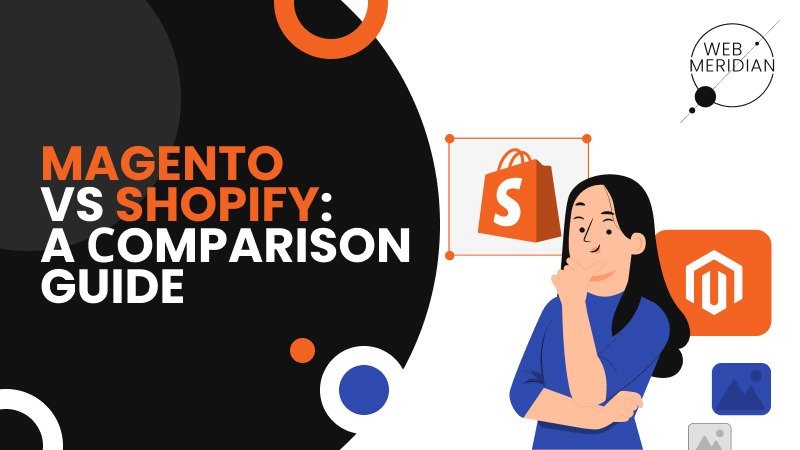Magento vs. Shopify: A Comparative Examination for Ecommerce Solutions
Choosing the right ecommerce organize is significant for the triumph of an online store. Two of the most well known choices open these days are Magento and Shopify. Both stages offer solid highlights and benefits, but they cater to unmistakable needs and commerce sizes. This article will compare Magento and Shopify over diverse points to offer help you choose which arrange might be the best fit for your ecommerce commerce.
Ease of Use
Magento
Magento is known for its adaptability and customization capabilities, but this comes with a soak learning bend. It is an open-source stage, which implies you have full control over the plan and usefulness of your store. In any case, setting up and overseeing a Magento store regularly requires a great understanding of web improvement and coding. For businesses without specialized skill, this seem cruel contracting a engineer, which includes to the taken a toll and complexity.
Shopify
Shopify, on the other hand, is designed with user-friendliness in mind. It is a hosted platform, which means all the technical aspects like hosting, security, and updates are managed by Shopify. The intuitive drag-and-drop interface makes it easy for anyone to set up and run an online store without needing any technical skills. Shopify also offers a wealth of tutorials and customer support to assist users.
Customization and Flexibility
Magento
Magento’s open-source nature provides unmatched customization and flexibility. Businesses can modify every aspect of their store to meet specific requirements. This includes custom themes, extensions, and integrations. Magento’s extensive marketplace offers thousands of extensions that add various functionalities to your store. This level of customization is ideal for businesses with unique needs or those that plan to scale significantly.
Shopify
While Shopify moreover offers customization choices through topics and apps accessible in the Shopify App Store, it doesn’t coordinate the level of adaptability given by Magento. Shopify topics are less demanding to execute but are less customizable compared to Magento’s subjects. Shopify’s app environment is endless, but certain confinements exist when it comes to profoundly customizing the store’s center usefulness.
Cost
Magento
The cost of using Magento can vary widely. While Magento Open Source is free to download and use, there are expenses related to hosting, security, and development. Businesses may need to invest in hiring developers for setup and ongoing maintenance. Magento Commerce, the enterprise version, comes with a licensing fee, which can be substantial depending on the size and needs of the business.
Shopify
Shopify works on a subscription-based show with estimating levels extending from fundamental to progressed, which incorporate facilitating and security. The estimating is direct, and businesses can select a arrange based on their needs and budget. Be that as it may, extra costs can emerge from acquiring premium topics and apps.
Scalability
Magento
Magento is built to handle huge volumes of items and tall activity levels, making it profoundly adaptable. It is appropriate for businesses that anticipate to develop and require a vigorous stage that can handle complex operations. Magento’s versatility is one of its most grounded focuses, making it a favored choice for medium to expansive ventures.
Shopify
Shopify is also scalable and can accommodate the growth of businesses, but there are some limitations compared to Magento. While it can handle a significant amount of traffic and products, businesses with highly complex needs or custom requirements might find Magento more suitable. Shopify Plus, the enterprise version, offers enhanced scalability but comes at a higher cost.
SEO and Promoting Tools
Magento
Magento gives a comprehensive set of SEO apparatuses and alternatives to optimize your store for look motors. It permits for customization of URLs, meta labels, and sitemaps. Magento’s showcasing capabilities incorporate progressed advancements, client division, and personalized shopping encounters.
Shopify
Shopify also offers solid SEO features, including customizable title tags, meta descriptions, and sitemaps. Its marketing tools are user-friendly and effective, with built-in options for creating discount codes, gift cards, and abandoned cart recovery. Shopify integrates seamlessly with various marketing and analytics tools, making it easier for businesses to manage their marketing efforts.
Security
Magento
Security is a critical aspect of any ecommerce platform. Magento provides robust security features but requires proactive management by the store owner. Regular updates and security patches need to be installed to protect the store from vulnerabilities. Magento also supports SSL certificates and two-factor authentication.
Shopify
With Shopify, security is managed by the platform. Shopify takes care of all security updates, ensuring the store is protected against threats. SSL certificates are included in all Shopify plans, and PCI compliance is built-in, providing peace of mind for store owners.
Conclusion
Both Magento and Shopify have their strengths and cater to different types of businesses. Magento offers unparalleled customization and scalability, making it ideal for large businesses with complex needs and technical resources. Shopify, with its ease of use and managed hosting, is perfect for small to medium-sized businesses looking for a hassle-free, reliable ecommerce solution.
Ultimately, the choice between Magento and Shopify will depend on your specific business requirements, budget, and technical capabilities. Careful consideration of these factors will help you choose the platform that best aligns with your ecommerce goals.














Post Comment